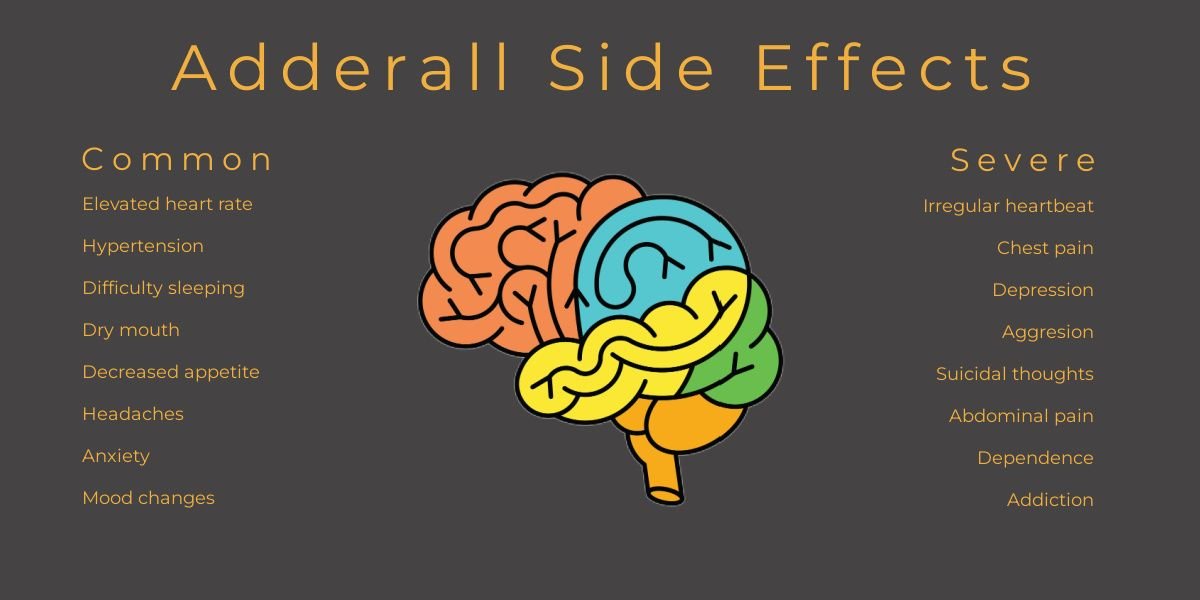Some people turn to Adderall as a weight loss shortcut, believing its appetite-suppressing effects will help them shed pounds quickly. While stimulant medications like Adderall can lead to short-term weight loss, this comes at a high cost to physical and mental health. Misusing Adderall for weight control increases the risk of dependency, heart issues, and disordered eating behaviors.
Despite its reputation as a "quick fix," Adderall-induced weight loss is unsustainable and dangerous. This article explores how Adderall affects weight, the serious risks of misuse, and safer, medically sound alternatives for long-term weight management.
- Adderall is not a safe or sustainable weight loss solution. It may suppress appetite and cause short-term weight loss, but using it for this purpose can lead to serious side effects and health risks.
- Misusing Adderall for weight loss is dangerous and often linked to disordered eating behaviors. Studies show a significant association between non-prescribed stimulant use for weight control and unhealthy behaviors like purging, dieting extremes, and even the development of dependence.
- Safer weight loss alternatives exist. Proper diet, exercise, lifestyle changes, medically-supervised weight loss programs, and dedicated weight loss medications are all far safer and more sustainable than using Adderall.

How Adderall affects weight
Adderall causes weight loss mainly because of its stimulant action on the central nervous system (CNS). [1][2] By increasing the release of dopamine and norepinephrine, Adderall enhances alertness and energy. A common side effect of this process (and of many stimulants) is appetite suppression. [3][4]
Weight loss can occur with reduced caloric intake. In addition, Adderall can raise the body’s metabolic rate—it speeds up heart rate and energy expenditure slightly, causing the body to burn more calories at rest than it usually would. [4] This combination of eating less and burning more calories can lead to noticeable weight loss in the short term.
However, Adderall-induced weight loss is usually temporary and not sustainable. The body often adapts: Over time, appetite may return, or tolerance to the drug’s effects may develop, reducing the weight loss effect. When someone stops taking Adderall, their metabolism and appetite rebound to normal, which leads to regaining the weight that was lost. [4] In some cases, rebound hunger can cause rapid weight gain after discontinuation.
It’s also important to note that any weight loss from Adderall comes with no nutrition guidance—one might lose weight in an unhealthy manner (e.g., by losing muscle or becoming nutrient-deficient). Thus, while Adderall can affect weight by curbing appetite and boosting metabolism, these effects carry risks and are not a sound basis for a weight management plan.
Do ADHD medicines affect weight?
ADHD medications, particularly stimulant drugs like Adderall or Ritalin (methylphenidate), can significantly affect weight, especially in children and people new to taking the medications. It's a well-known fact that stimulant medications cause weight loss or slowed weight gain as a side effect. For example, children with ADHD who start stimulant treatment often experience a period of weight loss or reduced appetite.
In a clinical study of young children (ages ~5–9) starting stimulants, researchers quantified an average fat loss of about 1.4 kg in the first 6 months of treatment. [5] This suggests that stimulants can suppress appetite enough to measurably stunt weight growth in growing children, illustrating just how powerful their effect on weight can be. The study recommends further research to determine these changes' effects on adult health.
But not all ADHD medications cause weight loss – some non-stimulant ADHD medications or adjunct medications can cause weight gain. For example, Guanfacine (Intuniv), a commonly prescribed alpha-2 agonist, can lead to moderate weight gain in some patients. [6]
The dangers of misusing Adderall for weight loss
Using Adderall without a prescription or at higher-than-prescribed doses for weight loss is dangerous and outweighs any temporary benefits.
Misusing Adderall for weight control can trigger serious long-term consequences, including dependency and severe health complications. Key risks include:
Physical health risks
Addiction & dependence
- Tolerance builds quickly: Higher doses become necessary for the same effect.
- High risk of addiction: Can lead to stimulant use disorder, withdrawal symptoms (fatigue, depression, suicidal ideation).[9]
Links to Disordered Eating
Diminishing returns
- Weight loss effects fade as tolerance builds, often causing weight rebound.
Safer alternatives for weight loss
If you’re looking to lose weight, it’s crucial to prioritize methods that improve your overall health rather than jeopardize it. Using Adderall (or any drug not prescribed for you by a medical professional) as a weight loss shortcut is not safe or sustainable. Instead, consider these safer alternatives:
Healthy diet changes:
- Focus on a balanced, calorie-controlled diet rich in vegetables, fruits, lean proteins, whole grains, and healthy fats.
- Reduce processed foods and sugary beverages to naturally lower calorie intake.
- Consider consulting a nutritionist or structured program to ensure gradual, sustainable weight loss without nutritional deficiencies.
Regular exercise:
- Incorporate aerobic activities (walking, running, cycling, swimming) that build endurance and target the cardiovascular system, along with strength training (weightlifting, body-weight exercises).
- Boost metabolism, burn calories, and improve overall fitness, mood, and heart health.
- Even moderate, consistent activity can be more effective in the long term than relying on quick fixes.
Lifestyle and behavioral changes:
- Try and get enough sleep to help regulate appetite and reduce cravings.
- Manage stress – techniques like yoga, meditation, or engaging in hobbies to prevent emotional eating.
- Practice mindful eating by paying attention to hunger and fullness cues, and track progress using food diaries or apps.
- Seek support from groups or counseling if needed to build healthier coping strategies.
Consultation with healthcare professionals:
- Discuss weight loss challenges with a doctor or registered dietitian to address potential underlying issues.
- Explore FDA-approved weight loss medications (e.g., Wegovy, Contrave) or other supervised medical interventions as appropriate.
- Consider bariatric surgery for severe obesity, always with proper medical guidance.
Are you concerned about Adderall misuse?
Recognizing Adderall misuse or addiction in yourself or someone you care about is an important first step toward getting help. Sometimes, the signs can be subtle at first. Here are some signs of Adderall misuse or developing addiction to watch for:
- Signs of misuse: Taking Adderall without a prescription, doctor shopping, or buying from non-medical sources. [9]
- Indicators of addiction: Increased dosage and frequency of use, neglecting usual social and work-like responsibilities such as classes, work, or social engagements, and prioritizing drug use over hobbies and interests. [10]
- Physical and mental health warning signs: Disrupted sleep patterns, unhealthy weight loss, and mood swings. Physical symptoms like chest pain, rapid heartbeats, or shortness of breath. Severe cases may involve hallucinations, paranoia, or panic attacks. [9]
Steps to seek help for recovery
Acknowledging the need for help is a vital first step—explore professional support, treatment options, and trusted networks to start the path to recovery.
- Talk to a trusted healthcare professional: Discuss the issue openly.
- Explore treatment options: Ask about a supervised tapering schedule and/or medical detox. Consider outpatient counseling, support groups, inpatient rehab, or CBT for cravings and underlying issues. Ask about addiction support services.
- Address co-occurring disorders: Seek programs that treat both stimulant misuse and eating disorders.
- Lean on your support network: Talk to trusted friends or family members for accountability and emotional support. Work with a mental healthcare therapist to develop healthier coping strategies for stress or related mental health challenges.
- For concerned loved ones: Gently encourage seeking professional help and share information about the risks. Approach the situation with empathy and avoid judgment and accusations.
Recognizing the signs early and taking proactive steps toward help is crucial for reclaiming a healthy, balanced life.




-guide-detail.jpg?v=1756808523)